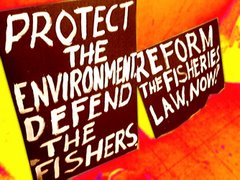
PRESS STATEMENT
September 29, 2009
APPEAL FOR A GENUINE AND BINDING CLIMATE POLICIES AT UNFCCC TALKS
We fisherfolks coming from different organizations in Sri Lanka, India, Philippines, and Thailand are here in front of United Nation ESCAP to dramatize our plight caused by the worsening impacts of climate change to marine ecosystems and our communities.
Climate change has drastically altered our fishing ground. Our life is becoming harder and more miserable as we experience declining fish catch and production in our region.
We are already experiencing the impacts affirmed by the Fourth Assessment Report of the UN-IPCC, that the unprecedented concentration of Global warming gasses is causing the rise of global ocean temperature leading to coral bleaching, calcification and death of marine species abundant I various waters found in our regions.
Rising global temperatures does not only affect our food sources but is also making the sea level to rise, Millions of us are force out of our communities to seek higher grounds and in order to protect ourselves from frequent storm surges.
Based on recent scientific data from various institutions, million hectares of coastal areas in Asia and South-East Asia such as India, Sri Lanka, Thailand, Vietnam, including the Coral Triangle consisting of Indonesia, Malaysia and the Philippine archipelago considered as the center of global marine biodiversity will be heavily impacted by climate change related disasters.
Worst irony of all, national governments in these regions, like the Philippines failed to protect its fishing communities and marine ecosystem and is accelerating the destruction of our lives and livelihood by pursuing globalization. This thrust is making fishefolks among the poorest in the country and most vulnerable to the impacts of climate change.
Fisherfolk leaders who were present at the protest action at UN agreed that “Climate negotiation should always put first the needs and rights of poor people like the fisherfolks in Southeast Asia and not the interest of northern rich countries like the United States, European Union and Japan. National governments in the region should learn from its experience in pursuing globalization policies like liberalizing the fishery sector does not lead to economic development but to widespread poverty and devastated environment.”
The UNFCCC intersessional meeting here in Bangkok should lead to an international agreement that will genuinely address climate change and stop marine degradation in the region. In order to do this national governments should unite in opposing carbon intensive globalization policies in the region.
FIDEC Inc.
Sri Lankan Fisherfolks Federation
Southern Thailand Fisherfolks Federation
National Association of Fishermen Andhra
PAMALAKAYA Philippines
Students Federation of Thailand
Philippine Climate Watch Alliance





No comments:
Post a Comment